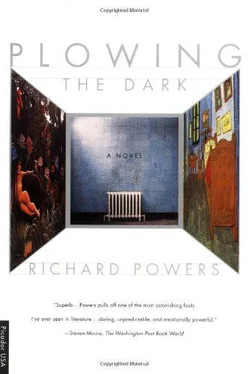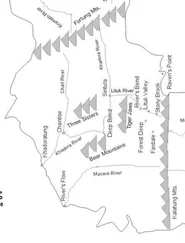You rush after her, to prove that you can't hurt her. No guards stop you; it happens too quickly. She flees your attempted comfort, terrified. She stops, cowering, her arms above her head. You take her arms gently, to lower them from her face once and forever. She stiffens, and you pull harder.
In the flash of an instant, the tug escalates into the full contest. Now you could truly hurt her, slap her hard, to stop her struggle, to carry her back into the room's safety before the larger insanity finds you out here. And in that moment of violence, you are everything she has feared in you, everything she always knew was knocking around inside you, awaiting only this awfulness to be born.
She disappears. Throughout that dry season, she will not come back. But she leaves behind something more useful than remorse. For in that impulse chase, she has taught you how to spring from this prison down to the street below.
You pace yourself. You draw out the exercise in stages. You work up the block of Lincoln Park immediately outside your building. The goal is largesse, weight, a map on the scale of an inch to an inch. You stand still until every contiguous brick and block of concrete reconvenes. No gaps: you refuse to step down the street until every fuzzed foot fills out with casements and moldings.
Seventeen doors on your side of the street. Twelve, plus two shops and a parking garage on the other. Four stories of apartments, shoulder to shoulder, each one occupied with lives scavenging for scraps of love, scrambling to keep current, scrabbling to survive on the crust of the world's collapsing infrastructures. You move through this staggering set, a denser network than your eye ever made out when you actually lived there. Half a residential block lays out a universe so nauseatingly profuse that you need the safety of your cell even to consider it. Your Qur'an is right: the God of Creation is as close as your own jugular. And as far.
Your cell sits inside a similar hive, the hive in its own warren, the warren in a neighborhood as dense as the one you reconstruct. You try to walk abroad here, too, but every attempt fails. You can no longer resolve the school, or the faces of your students. For all the weeks that you lived there, your Beirut compound now stands locked to you. You can't even say what floor you now inhabit, let alone the size of this building. From the sound of traffic, the street lies no more than two flights below you. You try to fall quietly to this pavement, but can't. You open the door and take the stairs, but the city waiting at the bottom of the stairwell is never this one.
Lives swarm on all sides of you, through these walls, across the gully of street that the sun must surely warm and expand. Other lives live out their existences not a hundred feet from you: other Westerners, bargaining chips in a game the point of which even the principal players no longer remember. You hear their scrapings, their muffled back talk to the guards. You savor the evidence of their hurried ablutions as you rush through your own bathroom runs. But you can't see them, can't
make them out.
A hundred meters farther out, two hundred, half a kilometer: your throw nets tear under the haul. Hundreds of thousands of Lebanese of all denominations live locked away in holes that bless yours by comparison, with no world superpower, however impotent, to demand accounting for their treatment. You put yourself in these streets, but they vanish beneath your feet. You've learned the ability to venture forth at will. Full-color, high-resolution. But always only Chicago. Always the near North Side, life before lifelessness found you out.
Through long practice, applied urban renewal, you fill in every surface of your former block. There you reprise your old existence, an invisible tourist, threading through the mass pageant. Incubus again, among the lives that you depended on for every particular, people that you fed off without even bothering to learn their names. What you liked to call a private person, a solitary one, all the dress-up terms for parasite. Now that you'd knock on their doors, enter their living rooms give yourself wholeheartedly to your bit part in the improvised script you can't. Your neighbors pass right through you on the street. You an the phantom you worked so hard to be.
They give you the keys to the city, abandon you to free excursion: deeper downtown. You make a left on Clark and head down past the Historical Society. Jog over to Dearborn or La Salle, depending upon barometric pressure. The weather is always spring. When you stop, a Gilded Age mansion or pretty brownstone façade slides into focus. But you don't often stop, short of your destination.
The approach to the Loop, always on Michigan, picks up definition. The Hancock, the Water Tower. On the bridge, the full panorama comes back. The newspaper buildings, Marina Towers. But bit by bit, even the throwaway filler solidifies, the tumbleweed concrete thrown up in the alleys and interstices. You start to remember buildings you can't ever have registered in all your years living in this town.
But this is still not what you've come to see. You click off the last mile, down the superb stretch that the two of you took at most six times, in all your two and a half thousand opportunities to walk it together. The line of the lake opens. Buildings to the left of you fall away, leaving on your right a sheer cliff face of masonry and glass. When the explosions issue from the direction of Navy Pier, you hold them at bay. Nothing human can harm a single pane of this illusion.
Twin carved lions enlarge in front of you, proving your forward motion. The sensation is uncanny, like sitting on a stationary train while another backs up on the next track. If you can mount the stone steps, get past the coat check, the bookstore, the ticket booth, if you can climb up the grand central staircase without some street detonation or strip assault by sadistic guard, you are home free.
Once you reach that second floor, nothing can harm you. Time lies crumpled in a heap, back downstairs at the coat check. Always a footrace; you can't enter the museum except through that long walk in from the North Side. The slightest tracer can defeat you, any block along the way. But once you're here, the soul-pithing dullness of existence has no more say.
The day still advances at its old rate, but you no longer feel it. Your heartbeat races or freezes, turns on a pin, floats on a seascape, jumps through a circus hoop, does whatever you tell it to do. It trawls in the afternoon light, downstream from an old mill. It ascends into heaven with the Virgin. It dawdles, designless, at a cafe full of boaters. It floats in a porcelain footbath full of water.
Hours may pass in your absence. Sometimes you come back, and the gaping wasteland between lunch and dinner has vanished. Sometimes the day has not budged since you set off, and all you have to show for your weekend away is swollen feet. But so long as you are here, you are safe from both hope and its opposite. There is no long, no short, no tedium, no delay. Only the dimension-free now.
Time here is caught in the thinnest frozen section, sliced off and held to the light. At every inhabited moment, someone has needed to make these plays of line, these shorthands for elsewhere, for ever. You came here too rarely to fix in your mind more than a few dozen of these trapped eternities. But how many eternities does one person really need? Any one will fill all the space you give it.
Surviving to find your way here, you're free to range at will. You lie back in a manicured green park on what seems a riverbank. You stand on a platform in a glass-roofed railroad station, filling up with steam. Who would have thought you'd have such a memory for color? You cannot remember the color of Gwen's eyes, but you can make out the girl at the half door's, down to their nearest wavelength.
Читать дальше












